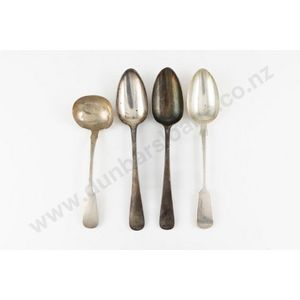Victorian Sterling Silver Spoons and Ladle Set, Mixed Patterns
Pair of Victorian sterling silver tablespoons, Old English pattern, together with a Victorian fiddle pattern tablespoon and an Irish fiddle pattern sauce ladle (bowl split), approx 244 grams
You must be a subscriber, and be logged in to view price and dealer details.
Subscribe Now to view actual auction price for this item
When you subscribe, you have the option of setting the currency in which to display prices to $Au, $US, $NZ or Stg.
This item has been sold, and the description, image and price are for reference purposes only.
- Old English Pattern - The Old English pattern as is commonly seen on silver flatware is characterized by a simple, clean shape with a slightly upturned tip and a broad handle that tapers gently towards the bowl or blade. The handle may be plain or decorated with a subtle design, such as a line or ridge along the edge or a small decorative motif at the tip. This pattern was first introduced in the 18th century and has remained popular ever since, making it a popular choice for traditional and formal table settings.
- Sterling Silver - Sterling silver is a mixture of 92.5% pure silver and 7.5% of another metal, usually copper. Fine silver is 99.9% pure silver, and is relatively soft and the addition of the very small amount of copper gives the metal enough strength and hardness to be worked into jewellery, decorative and household objects.
- Victorian Period - The Victorian period of furniture and decorative arts design covers the reign of Queen Victoria from 1837 to 1901. There was not one dominant style of furniture in the Victorian period. Designers used and modified many historical styles such as Gothic, Tudor, Elizabethan, English Rococo, Neoclassical and others, although use of some styles, such as English Rococo and Gothic tended to dominate the furniture manufacture of the period.
The Victorian period was preceded by the Regency and William IV periods, and followed by the Edwardian period, named for Edward VII (1841 ? 1910) who was King of the United Kingdom and the British Dominions and Emperor of India for the brief period from 1901 until his death in 1910.
This item has been included into following indexes:
- ladles, sauce - silver items 320
-
silver cutlery / flatware, patterns
- fiddle pattern 1,129
- Old English pattern 512
- spoons, silver - table spoons 406
